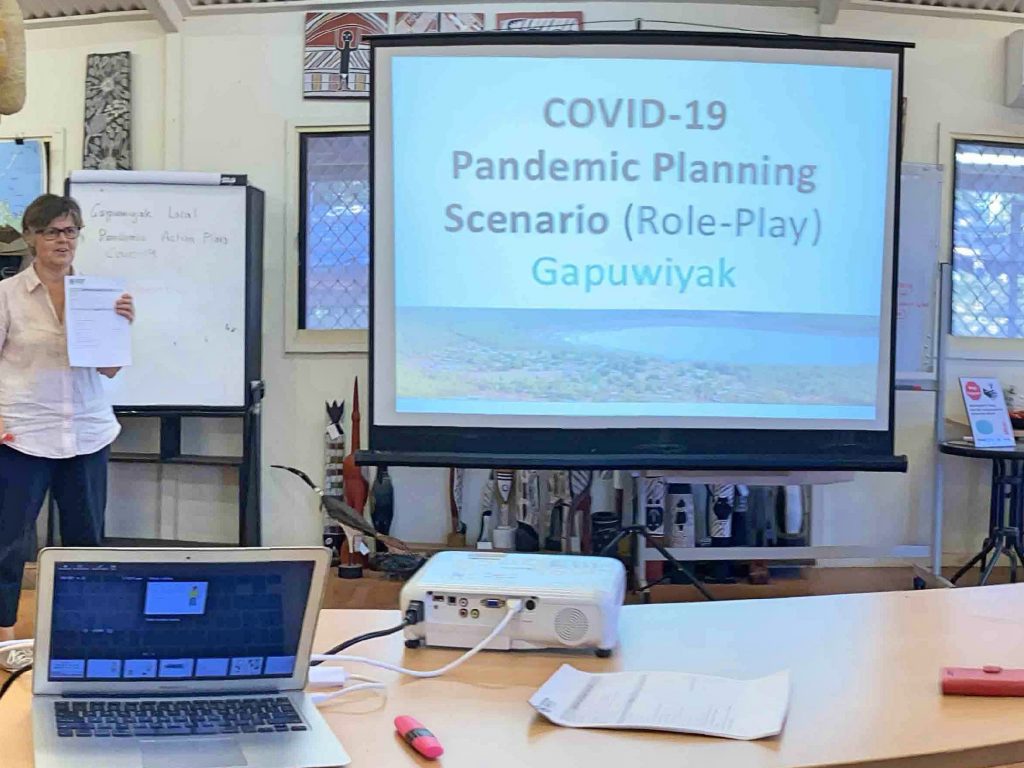Community stories COVID Recovery: 23 February 2022
A grant originally intended to help the Gong-Dal Aboriginal Corporation increase opportunities for the Gapuwiyak community in East Arnhem Land was partially diverted to help the community respond to COVID.
The FRRR Westpac Rural Communities Grant of $10,000 was originally intended for tourism business education and mentoring programs in the Northern Territory, to support the organisation in its capacity and capability as it embarked on a niche tourism venture. However, as 2020 unfolded, the organisation recognised that there was a more urgent need to support the community in managing and responding to the emergency that COVID had created.
General Manager Juli Cathcart said that half the grant was used to employ experienced facilitators to run workshops, develop resources and support community engagement with the Gapuwiyak and Homelands COVID-19 Dhäwu Ganamirr Mala (COVID-19 Both-Ways Community Engagement Group).
The second half was directed toward the original purpose and used for facilitating workshops, recording and documenting the Miriŋu Dhukarr – Warriors’ Walk – cultural tourism project.
The COVID-19 response group was formed by Yolŋu leaders to provide intercultural advice to government agencies and other stakeholders and ensure culturally safe and appropriate community engagement.
The facilitation included education and training for 15 local Yolŋu people about COVID and a Local Pandemic Action Plan and Outbreak Management Plan. It included key materials in plain English and Djambarrpuyŋu, the local Indigenous language, as well as ‘just-in-time’ advice and support for the local police, clinic and other stakeholders.
This work empowered 900 local Yolŋu community residents in Gapuwiyak and Homelands by giving them knowledge and understanding they needed to keep their families informed of COVID and the NT government responses.
“This ensured a highly responsive and culturally safe COVID Local Pandemic Action Plan, and directly contributed to the development of respectful and trusting relationships between local Yolŋu leaders and community members, and our stakeholder organisations and employees in relation to the local management of COVID and safety of Gapuwiyak and our Homeland communities,” Juli Cathcart said.
“Feedback received was that as a result of this work, local Yolŋu community members felt respected, well informed, heard, assured, secure and safe in a time of great uncertainty, which improved everyone’s quality of life. This work was also key in the development of trusting relationships between stakeholders and Yolŋu community members. The very high uptake of vaccinations in Gapuwiyak and Homelands (80% of eligible community members) compared to other Aboriginal communities and the rest of Australia in 2021 can also largely be attributed to this work. This is a potentially life-saving outcome in a community where chronic disease placed at least 60% of our population in extreme danger if they should contract the coronavirus.”
The second part of the funding supported the development of a museum and a Yolŋu cultural tourism initiative comprising a series of heritage trails across Arnhemland. They follow the foot patrols of the Miriŋu (Yolŋu warriors) who formed the first Northern Reconnaissance Unit with Dr Donald Thompson and defended the Northern coastline during WWII. A high-quality documentary about the Miriŋu Dhukarr Project will also to attract funding to enable the development of this Yolŋu cultural heritage trail and tourism initiative that is of huge local cultural and historical importance as well as of National historical significance.
It is also funding ongoing workshops to enable Yolŋu Elders and Leaders to work with both Yolŋu and Balanda soldiers and veterans, as well as young Yolŋu people to ensure the intergenerational transfer of important and endangered Miriŋu cultural traditions, stories, knowledge and skills.


